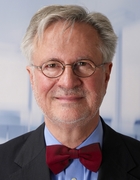Ulrich Trottenberg

Director of the Fraunhofer Institute for Algorithms and Scientific Computing SCAI Germany
Personal website
Trottenberg received his doctorate in 1972 from the University of Cologne. In 1977 and at the age of 32, he became a professor of Applied Mathematics at the University of Bonn. After his time in Bonn he became a professor of Mathematics in Engineering at the University of Essen. Since 1984 he holds the chair of Applied Mathematics & Scientific Computing at the University of Cologne. From 1995 to 1996 he was a visiting professor at the Courant Institute (NYU). Since 2001, he has been the director of the Fraunhofer Institute for Algorithms and Scientific Computing located in Sankt Augustin. From 2006 to 2009, he was the chairman for the board of directors of the Fraunhofer center located at the Schloss Birlinghoven.
In addition to these accomplishments, Trottenberg was also the initiator and scientific director of the SUPRENUM project and the European GENESIS project. He was the chairman for several initiatives and advisory boards, such as the initiative for the German High-Performance Computing Center, the scientific-technical advisory board of the PALLAS GmbH, and the advisory board of the Carl F. Gauss Center for Scientific Computing located at the Weizmann Institute in Israel. He also was an advisory board member of the Potsdam Institute for Climate Impact Research. In the early 2000s he was deputy chairman of the Fraunhofer Alliance for Information and Communication Technology and became director of the Simulation and Software Technology Institute of the German Aerospace Center (DLR). Furthermore, Trottenberg represented the Fraunhofer-Gesellschaft as a member of the coordination committee for the ”Year of Mathematics 2008”. Since 2008, he has also lead the supervisory board of scapos AG, and became president of the Association of Friends and Sponsors of the Forschungszentrum Jülich in 2009.
Among other honors, Ulrich Trottenberg received the Humboldt Award for the French-German Scientific Cooperation, the ECCO Award, and the SUPARCUP.
Mathematical Education meets Reality and Future
The foundation of industries and economics increasingly depends on the so called "MINT" disciplines: mathematics, informatics & computer sciences, natural sciences, and technology. In real life, mathematical developments and their applications have progressed drastically, which includes computer-driven numerical simulations and other tools for modern problem solving. Today mathematical modeling and algorithms have a massive impact on the way we live and work - they are the basis of almost every technical improvement, and are fundamental for many industries, e.g. logistics, transport, traffic management, and sectors of financial management.
Unfortunately, these modern developments have been poorly integrated into school curriculums. Traditional mathematical education is often dominated by antiquated content and ways of thinking, coupled with rather formal teaching methodologies that stiffen creativity. Therefore, rethinking curricula and approaches is necessary in order to fully prepare the next generation for understanding the implication of mathematics for society and for each person.
To improve mathematical education, an increase in the understanding is needed that mathematics is a critical tool for problem solving. A key towards realizing this goal is an intensive training in the use of algorithmic thinking that illustrate to students how mathematics is the foundation of modern technologies. Such technologies include everyday applications such as cell phones, navigation systems, mp3, and credit cards.
Presentation
To view this presentation you need the Adobe Flash Player.
Download Presentation: PDF (1.8MB)
